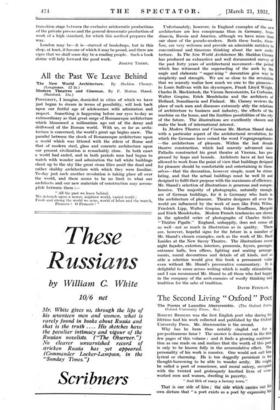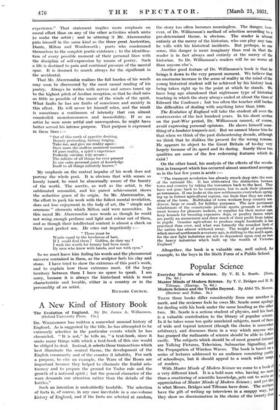The Second Living " Oxford" Poet
The Poems of Lascelles Abercrombie. (The Oxford Poets. Oxford University Press. 6s.)
ROBERT BRIDGES was the first English poet who during his lifetime had his work collected and published by the Oiford University Press. Mr. Abercrombie is the second.
Why has he been thus notably singled out for a pre-posthumous fame ? The answer is discovered in the first few pages of this volume : and it finds a growing confirma- tion as one reads on and realizes that the worth of this poet is only to be known. fully in the accumulative effect. -The personality of his work is massive. One would not call him lyrical or charming. He is too doggedly persistent in his thought-burrowing to be able to wander aerily. He might be called a poet of conscience, and moral outcry, occupied with the twisted and grotesquely knotted lives of over- worked men and women, dwelling in poyerty,
" And filth of many a factory town."
That is one side of him ; the. side whieh- "carries out hi own dictum that " a poet exists as a poet by expreising hie experience." That statement implies more emphasis on moral effort than on any of the other activities which unite pp make the artist ; -and -in - -uttering - it Mr. Abercrombie puts himself in the same kind as the three great Austerities, Dante, Milton and Wordsworth ; poets who condemned themselves to the complete poetic existence ; to the identifica- tion of every possible moment of their personal lines with the discipline of self-expression by means of poetry. Such a life is destined to pain and continual pressure of the mental spur. It is doomed to search always for the significant in the accidental.
That Mr. Abercrombie realizes the full burden of his words may soon be discovefed by the most casual -reading of his poetry. Always he writes with nerves and senses tuned up to the highest pitch of Aeolian reception, so that he shall miss as little as possible of the music of the winds of the spirit.
What faults he has are faults of conscience and anxiety in this effort. He will never let himgelf relax, and the result is sometimes a continuum of intensity that can almost counterfeit monotonousness and insensibility. If as an artist he were more artful and unscrupulous, -he might have better served his intense purpose. That- purpose is expressed in these lines :— " Out of this earth of appetite desiring, Beauty pretending, fantasy forging, Take me, and give me reality again : Once more the endless unmoved moment- Of pure reality, a spirit's experience - Perfectly circular, icily secure : The infinite of all things for ever present In one calm personal point of knowledge Itself to all things infinitely known."
My emphasis on the central impulse of his work does not portray the whole poet. It is obvious that with senses so keenly tuned, he must be abnormally aware of the beauty of the world. The ascetic, as well as the artist, is the sublimated sensualist, and his purest achievement shows the seductive grace of its origin. So Mr. Abercrombie, in the effort to pack his work with the fullest mental revelation, does not lose enjoyment in the body of art, the " simple and sensuous " elements which Milton said were necessities. In this mood Mr. Abercrombie uses words as though he could not wring enough perfume and light and colour out of them, and as though their intellectual content is almost a check on their most perfect use. He cries out impatiently :- "There must be Words equal to the loveliness of hair, If I could find them ! Golden, do they say ? I wish the words for beauty had been made By men who knew with hands, and not with eyes."
So we must leave him feeling his words and the phenomenal universe contained in them, as the sculptor feels his clay and stone. I have tried to show the extremes of this poet's work, and to explain how those extremes meet. Of the large territory between them I have no space to speak. I am sorry, because it is always the hinterland which is most characteristic and lovable, either in a country or in the personality of an artist.
RICHARD CHURCH.



















































 Previous page
Previous page